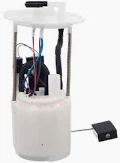The fuel pump is a key component in an internal combustion engine, which delivers the fuel from the tank to the combustion chamber of an engine. It plays a crucial role in providing the right quantity of gasoline to an engine at the correct pressure for optimum performance. Carbon Canister: — The Fuel pump (measured in PSI, which means pounds per square inches) Apply Pressure anywhere from 14psi to as high as 100 psi or higher depending the type of fuel injection you have.
The fuel pump on most modern vehicles is an electric pump that runs between 35 and 65 PSI, depending on the vehicle. The fuel is more fine atomized for combustion, because the pump has to provide an extra injection pressure while filling at a high speed when hung on this system saying it will make your engine works better and save some gasoline too. For instance, a standard sedan could run smoothly on 50 PSI whereas an ultra-high-performance sports car might need something like 65 PSI to have it cater for the demands of its much honker engine.
Using an impeller/hose design, the fuel pump consists of many small parts and works efficiently in part due to its pressure regulator. The impeller (usually made of nylon or plastic composites) inside these units spin at high RPMs, which creates the pressure. The pressure regulator maintains a constant flow of fuel, independent of engine speed or load. This consistency of fuel delivery is essential for preserving the integrity and reliability of an engine, it ensure that there are less chances if misfire or even stalling just because of inadequate flow.

There are two primary kinds of fuel pumps: mechanical and electric. Mechanical fuel pumps are more common in older vehicles with carbureted engines, as well. These pumps are diaphragm and work at lower pressures, usually between 4 to10 PSI due to carburetors being able run on less fuel pressure. On the other hand, electric fuel pumps are most commonly used in newer fuel injected engines that require significantly more pressure to properly atomize the fuel. Furthermore, electric pumps are more effective than their mechanical counterparts and can thus be linked to the vehicle's engine control unit (ECU) in order to regulate fuel flow according real-time needs of the motorysqli
Longevity and Durability fuel pump performance The life expectancy of a fuel pump is typically between 100,000 and 150,000 miles due to factors including the quality of gas used in your vehicle as well as driving conditions. A pump fitted with debris from poor fuel quality or contamination will not last long as the impeller and other components inside can be scored by this rubbish in seconds. Some details, suchjsonRemoveasdfChanging Fuel FilterRegular maintenance like fuel filter replacement can prolong the life of your pump and assure proper operation.
Fuel pumps, have hundreds of recalls and technological advancements swirling around them in the real world. In 2020 we saw Toyota recall 5.8 million vehicles because the pumps -- basically, a weak aspect of circuitry was found in them causing an electrical issue to trip and this stopped fuel flow mid drive; Talk about Engine Stall!! This is particularly notable given the impact of a pump's failure on both vehicle safety and a driver’s ability to travel in areas with high air temperatures.
If you would like more information about how fuel pumps work and exactly what types are available in the market, head to Fuel Pump for full specifications or specific options of fuel pump upgrades. Knowing what a fuel pump does, and why it is so important to you or anyone that has an interest in automobile maintenance means we should start with its intention.
